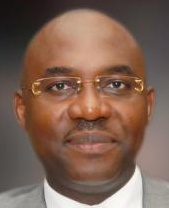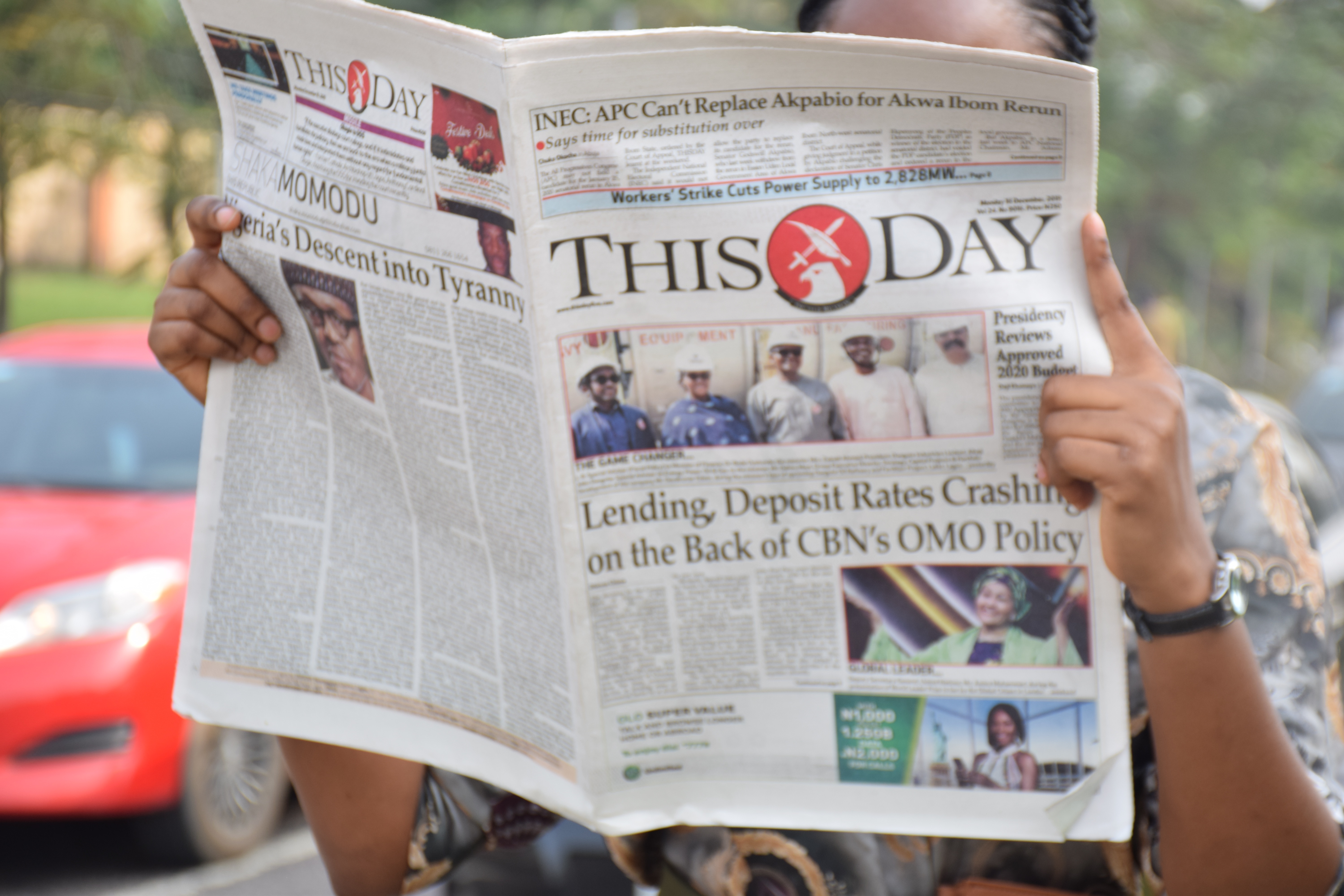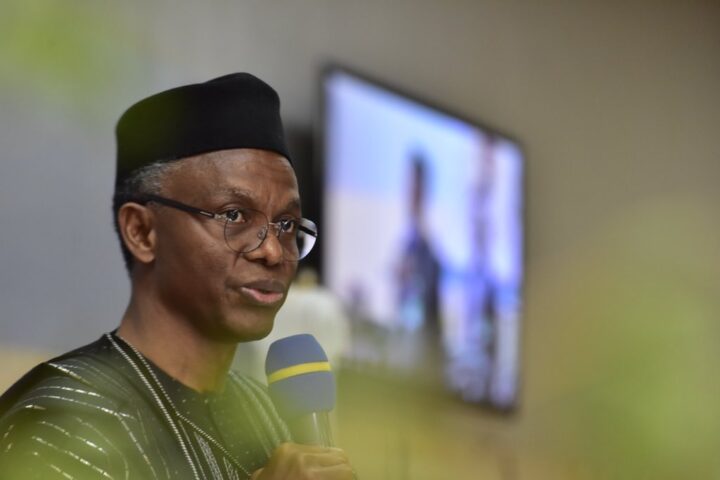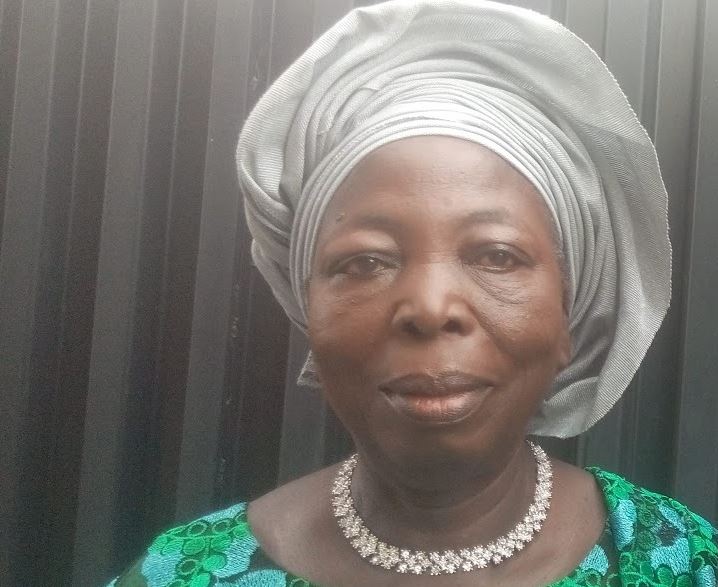The easy business plan will assume that cash – tones of it – performs all the magic. But not in all cases. As anyone familiar with the difficult beginnings of THISDAY will attest, guts and sheer improvisation sometimes prove far more invaluable resource.
If the earth indeed shook a quarter century ago when THISDAY emerged, it was largely because it started by shattering a few ancient media myths: the indispensability of sub-desk, running daily newspaper without owning a printing press, big office and deep pocket.
Yours sincerely was among the founding staff assembled in the heat of June 12 struggle when the national space was choking under the stranglehold of Sani Abacha – arguably the most brutal military dictator in the nation’s history.
Where we started in Lagos was indeed only a little more than a room-and-parlor on the last floor of a three-storey building. Furniture was, for instance, scarcely enough to sit everyone at peak hours. But for this youthful army, a passion for the written word and faith in its power to engage the then fledgling military despotism were comforting enough.
Advertisement
Sometimes, folks had to literally squat on the plush brown rug to scribble reports on sheets torn off stubs of newsprint reels scavenged from distant printing press. Others didn’t mind standing in the balcony with only a limited view of the Ikoyi skyline.
THISDAY was aspiring to fill a vacuum. Raw talent was seizing a historic opportunity. Existing media giants like Concord, The Guardian, Punch and Sketch had been proscribed by the military over their critical reportage. So, that meant a glut of seasoned but “jobless” journalists available to drive THISDAY from the outset.
I got signed on immediately I was introduced to The Duke (Mr. Nduka Obaigbena) in the corridor by the News Editor, ebullient Victor Ifijeh (who had been my senior colleague at the politics desk of Concord Press).
Advertisement
“Oh, I’m familiar with the name,” he said, offering a warm handshake. “Welcome on board.”
Soon afterwards, folks like us found we had to adapt to a newsroom culture starkly different from where we migrated. The existing orthodoxy would designate the sub-desk as the filter, the ultimate gatekeeper in the newspaper process. Now, the THISDAY template more or less abridged the sub-desk, thus making the production chain compact and more swift to deliver, but imposing greater responsibility on the reporter in terms of the margin of error. The weight of that burden is better appreciated considering that it was not yet the age of internet or google when information could be sourced seamlessly to background a story while writing.
Even more energizing was the direct involvement of The Duke himself in news-gathering and production. The physical toll that later exacted was enough to knock him down one day such that he had to be evacuated to the hospital and put on drip. But against doctor’s advice, a tenacious Obaigbena would drag himself up soon after regaining consciousness, conceal the half-empty drip under a flowing Agbada and sneak back to the office, obviously to be sure his absence would not hamper the production of the next day’s edition!
Overall, The Duke’s vast network of powerful sources meant THISDAY reports were mostly in-depth and authoritative. The credit for stampeding Nigeria’s print media at the start of this millennium into the notion of “one edition nationwide” undoubtedly belongs to THISDAY.
I was privileged to be the pioneer Abuja editor in 2002 during that momentous transition. Amid sleepless nights for days on end, the takeoff of THISDAY’s Abuja plant was owed more to sheer human improvisations and adaption than the benevolence of technology. Whenever the affliction of technical glitch struck in the middle of the night (and that was fairly regularly), we literally had to cart desktop computers to Obaigena’s hotel suite for internet connectivity. Even after the teething problems had abated, for several months, I never closed formally from the Jabi office earlier than around 3 or 4a.m daily and then drove to faraway Asokoro to the home “donated” by compassionate Mr. Nduka Irabor (having moved to Apo Legislative Quarters as Reps member).
Advertisement
More, as against the old tradition of reserving the back page for sports exclusively, the daily newspaper opted from the outset in 1995 to devote that space to critical analysis of political issues and trend, handled by the politics desk anchored by Eziuche Ubani (ex-Guardian) and yours sincerely. Our boundless energy to sustain that grueling routine daily, spiced with the biting “missile” section, led us into being nick-named “The Unbreakable” in-house. And from there evolved the concept of back-page column that THISDAY patented and inspired others to follow in Nigeria’s media sector. Years later, those considered “popular” writers were shortlisted by the publisher to write back-page columns.
Expectedly, the heat radiated by the 24-hour operations of THISDAY now left the hitherto quiet neighborhood, where the office was located with the sleeplessness and unceasing human and vehicular traffic. Night and day, the lights never really went off inside THISDAY as folks chattered and bantered away in the heat of production, foisting a family spirit, with bubbly Ide Eguabor (General Manager) doubling as the inexhaustible bag of humour. Waziri Adio was unmistakable in the crowd with his contemplative taciturnity. Ditto sardonic Niran Malaolu who seemed in an undeclared competition with the publisher over the wearing of bow-tie.
Then, it was easy to tell when Eni-B was either making or receiving an “important” call. Whenever you saw him huddled in a corner of the office, momentarily discarding his trademark no-nonsense mien and smiling sheepishly on land phone (cellphone was not yet ubiquitous), you knew with certainty that his sweetheart (future wife but sadly recently deceased) was on the line. The rest of us would be waiting for him to hang up before pulling his legs.
But for all the relative big impact THISDAY made across the nation within a record short time, the big irony is that The Duke never started with a deep pocket. Insiders would squeal that, almost regularly, the limit of financial wizardry was stretched in trying to meet ever mounting invoices of suppliers of newsprint and consumables with the poor returns from dodgy newspaper distributors and buccaneering advert executives. Indeed, what The Duke actually had more was personal charm which he constantly summoned to access high places, open seemingly impossible doors and bewitch the tribe of creditors not to refuse him one more time. Managing workers’ compensation and expectations was a different kettle altogether. I remember a hilarious drama that unfolded one Friday in 1995 following a cash-flow hiccup and it became obvious that our weekly BTA (basic transport allowance) would not be paid. It was indeed past the middle of the month with most workers already gasping financially.
Advertisement
Suddenly, tension descended on the newsroom as folks came to terms with the prospects of spending the weekend with empty pockets. Then, it was confirmed that it would be half-pay.
Next, one of the frayed nerves erupted into an open tantrum. Surprisingly, it came from the least expected: Ifijeh!
“What nonsense is this!,” the newsroom head banged his desk with the full force of his heavyweight. “These are distress signals. If you know you don’t have the resources to run a newspaper, fold it up and let us go home!!”
Advertisement
Populist in content and cadence, Ifijeh (now Managing Director/Editor-In-Chief of The Nation) no doubt spoke the minds of almost everyone. The air literally froze as those subversive words echoed across the gloom of that testy evening. That they were uttered by a supposed “management staffer” in a voice too loud to afford the publisher (just a few steps away in the corridor) any excuse to pretend not to have heard made the atmosphere all the more charged.
“Who was making such a noise?,” The Duke turned around and queried half in jest, half in worry.
“It’s me Publisher,” said Ifijeh, raising a hand to claim responsibility as the rebel leader. “Look, Publisher, some of us are married men. How are we supposed to go home empty-handed on a weekend after working so hard. What are we going to tell our wives?”
Advertisement
Naturally, that elicited thunderous applause from all the workers. To calm nerves, the publisher then clarified: “Well, we’ve some cash-flow issue. But what the Accountant was going to give each of you is personal gratis, repeat personal gratis, from me. On Monday, you’ll still receive your full BTA.”
Moments afterward, I went to sign for my own “gratis” as well as Ifijeh’s. Calculating Obaigbena only waited to be furnished with the full list of beneficiaries of the “gratis” that evening before landing a mischievous counter-blow. On sighting Ifijeh’s name on the list, he came to the newsroom and announced jokingly: “With all the yanga you made earlier, I’m surprised Victor that you still went behind to collect the money.”
Advertisement
The entire floor erupted in rapturous laughter.
Such seed of conviviality planted early at the Ikoyi cradle would shape the culture of kinship that has defined the THISDAY family over the years. It perhaps best explains why the door is always left ajar for “defectors” wishing to return after they might have found that the grass was not greener elsewhere, with the task of “reconciliation and reintegration” often left for pacifist Kayode Komolafe irrevocably committed to the principle of “peaceful coexistence”.
At personal level, no less remarkable is Obaigbena’s instinctive inability to keep malice. Much later after our fierce legal battle over copyright following my exit to Sun in 2002, he would playfully pull me by the ear at the residence of our durable icon, “Uncle Sam” (Pa. Sam Amuka, Vanguard’s Publisher), querying: “Why were you absent at my 50th birthday?”
“I was not invited,” I defended. “Really?,” he frowned, turning to Eni-B (THISDAY Managing Director). “That’s your fault.”
In retrospect, I believe The Duke was content with winning the landmark case argued personally by legendary Gani Fawehinmi in court against Dr. Amanze Obi continuing with “Broken Tongues” and yours sincerely “The Bottomline” in Sun. Somehow, a “political solution” worked out: there was no fresh suit against me writing “The Bottomline” thereafter.
However, beneath The Duke’s seeming tough outlook is an uncommon tenderness, one that gets emotional at the departure of a staffer with whom he had bonded. We had two such difficult one-on-one encounters. First was at my first exit in December 1995. The 20-month proscription on Concord and others had just been lifted by the Abacha junta. He bluntly refused my “excuse” of gaining admission to UNILAG for a degree programme (I actually started in Concord with National Diploma from Federal Poly, Ado Ekiti three years earlier at age 18), saying he would not have opposed me enrolling for further studies even while working at THISDAY.
But honestly, beyond my estimation that THISDAY’s grueling routine would not afford me a breathing space at UNILAG, loyalty to the June 12 struggle made the return to Concord (owned by MKO) irresistible. Other “returnees” from THISDAY included Sam Omatseye, Eric Osagie and Waheed Odusile.
Back in Concord, I remained in touch with The Duke and he would normally ask me each time we spoke or met, “So, when are you coming back to THISDAY?” Eventually, my second coming in 2000 was literally forced by Segun Adeniyi with whom I had forged deep bond that transcended work at Sunday Concord between 1996 and 1998. I was Segun’s best man at his wedding to Tosin in December 1998.
When the groom later “defected” from Ikeja to 35 Creek Road few weeks after wedding, native intelligence must have alerted our editor and big brother, Mr. Tunji Bello, that Segun would soon pull me over. So, the drastic “preemptive” step he took was promoting me three whopping steps on a single day!
But Segun never really relented. By the time I graduated in the summer of 1999, I really had no more excuse to give Segun not to join him in THISDAY which “is for young people like us.”
Segun’s “plot” finally succeeded in March 2000, leaving me with the difficult task of breaking the “bad” news to Tunji Bello who had given me opportunity in journalism as a mentor and one who counseled me to go to UNILAG and earn a degree instead of returning to Federal Poly to obtain HND and, though of different faith and ethnic stock, virtually adopted me as a younger brother.
Two years later in THISDAY, my restless spirit pushed me to again approach the publisher and announce my decision to go join my former senior colleagues in Concord (Messrs. Mike Awoyinfa and Dimgba Igwe) to start Sun newspapers.
Sure, it turned out another emotional meeting in the publisher’s penthouse office overlooking the Apapa lagoon. Like every mortal, The Duke has his own frailties. But all those put together cannot in anyway diminish the monumentality of his contribution to media practice Nigeria in the last four decades.
Odion is senior technical assistant on media to the president.
Views expressed by contributors are strictly personal and not of TheCable.
Add a comment







